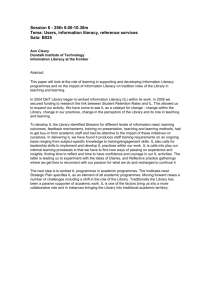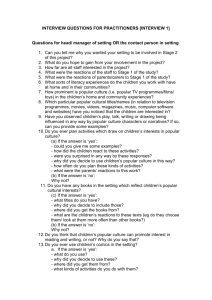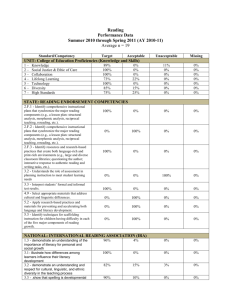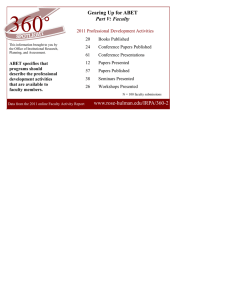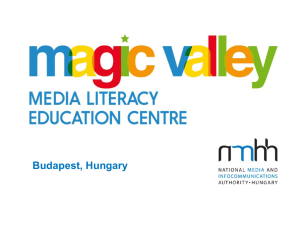Lifelong Learning as a Tool for Achieving Sustainable Human Developmental... Nigeria and South Africa
advertisement
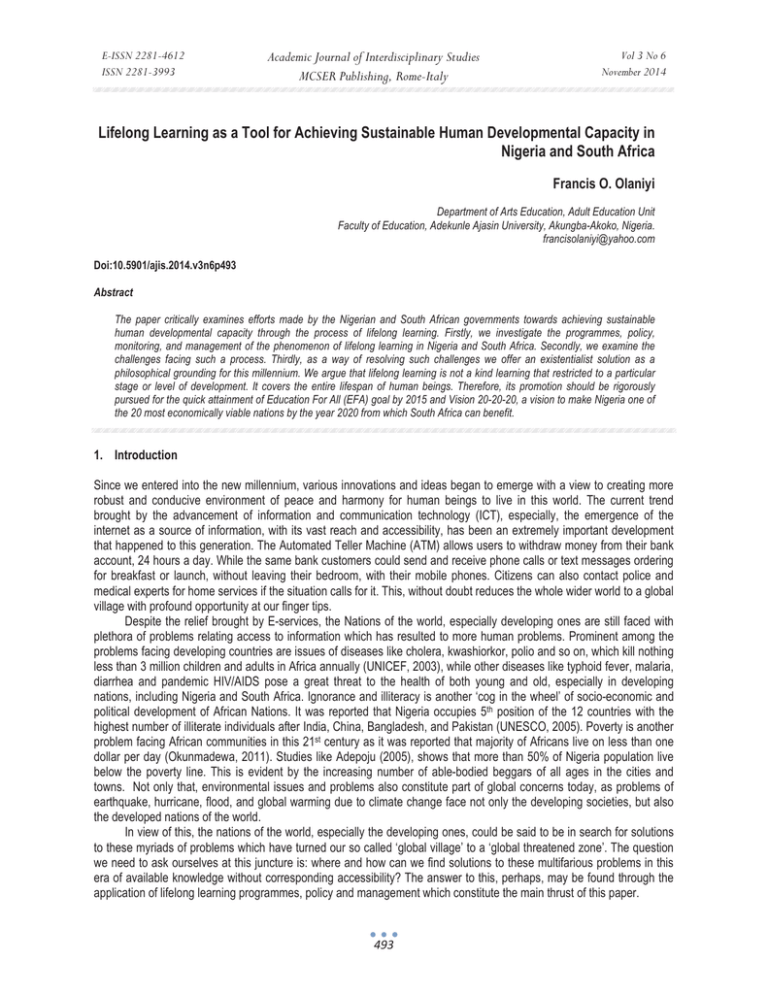
E-ISSN 2281-4612 ISSN 2281-3993 Academic Journal of Interdisciplinary Studies MCSER Publishing, Rome-Italy Vol 3 No 6 November 2014 Lifelong Learning as a Tool for Achieving Sustainable Human Developmental Capacity in Nigeria and South Africa Francis O. Olaniyi Department of Arts Education, Adult Education Unit Faculty of Education, Adekunle Ajasin University, Akungba-Akoko, Nigeria. francisolaniyi@yahoo.com Doi:10.5901/ajis.2014.v3n6p493 Abstract The paper critically examines efforts made by the Nigerian and South African governments towards achieving sustainable human developmental capacity through the process of lifelong learning. Firstly, we investigate the programmes, policy, monitoring, and management of the phenomenon of lifelong learning in Nigeria and South Africa. Secondly, we examine the challenges facing such a process. Thirdly, as a way of resolving such challenges we offer an existentialist solution as a philosophical grounding for this millennium. We argue that lifelong learning is not a kind learning that restricted to a particular stage or level of development. It covers the entire lifespan of human beings. Therefore, its promotion should be rigorously pursued for the quick attainment of Education For All (EFA) goal by 2015 and Vision 20-20-20, a vision to make Nigeria one of the 20 most economically viable nations by the year 2020 from which South Africa can benefit. 1. Introduction Since we entered into the new millennium, various innovations and ideas began to emerge with a view to creating more robust and conducive environment of peace and harmony for human beings to live in this world. The current trend brought by the advancement of information and communication technology (ICT), especially, the emergence of the internet as a source of information, with its vast reach and accessibility, has been an extremely important development that happened to this generation. The Automated Teller Machine (ATM) allows users to withdraw money from their bank account, 24 hours a day. While the same bank customers could send and receive phone calls or text messages ordering for breakfast or launch, without leaving their bedroom, with their mobile phones. Citizens can also contact police and medical experts for home services if the situation calls for it. This, without doubt reduces the whole wider world to a global village with profound opportunity at our finger tips. Despite the relief brought by E-services, the Nations of the world, especially developing ones are still faced with plethora of problems relating access to information which has resulted to more human problems. Prominent among the problems facing developing countries are issues of diseases like cholera, kwashiorkor, polio and so on, which kill nothing less than 3 million children and adults in Africa annually (UNICEF, 2003), while other diseases like typhoid fever, malaria, diarrhea and pandemic HIV/AIDS pose a great threat to the health of both young and old, especially in developing nations, including Nigeria and South Africa. Ignorance and illiteracy is another ‘cog in the wheel’ of socio-economic and political development of African Nations. It was reported that Nigeria occupies 5th position of the 12 countries with the highest number of illiterate individuals after India, China, Bangladesh, and Pakistan (UNESCO, 2005). Poverty is another problem facing African communities in this 21st century as it was reported that majority of Africans live on less than one dollar per day (Okunmadewa, 2011). Studies like Adepoju (2005), shows that more than 50% of Nigeria population live below the poverty line. This is evident by the increasing number of able-bodied beggars of all ages in the cities and towns. Not only that, environmental issues and problems also constitute part of global concerns today, as problems of earthquake, hurricane, flood, and global warming due to climate change face not only the developing societies, but also the developed nations of the world. In view of this, the nations of the world, especially the developing ones, could be said to be in search for solutions to these myriads of problems which have turned our so called ‘global village’ to a ‘global threatened zone’. The question we need to ask ourselves at this juncture is: where and how can we find solutions to these multifarious problems in this era of available knowledge without corresponding accessibility? The answer to this, perhaps, may be found through the application of lifelong learning programmes, policy and management which constitute the main thrust of this paper. 493 E-ISSN 2281-4612 ISSN 2281-3993 2. Academic Journal of Interdisciplinary Studies MCSER Publishing, Rome-Italy Vol 3 No 6 November 2014 A Conceptualization of Lifelong Learning Lifelong learning, according to the European Association for the Education of Adults (2006), include ‘all learning activity undertaken throughout life, with the aim of improving knowledge, skills and competence within a personal, civic, and social and/or employment-related perspective’. Lifelong learning is a concept that stresses the importance of learning throughout life. It encompasses the traditional formal education system (schools, training institutions, universities etc…), non-formal learning (structured on-the-job training) and informal learning (skills learned from family members or people in the community). It advocates that the formal education system should recognize skills acquired outside the system (Blom & Sohnesen, 2005). This means that lifelong learning is learning activities that take place from cradle to grave as every stages of man are bundled with different challenges that call for actions and ideas. Moreover, the focus on learning by the adult population is crucial, because they constitute larger percentage of the working class whom their services are very essential to national development. People living in rural areas, older adults, migrants, indigenous populations, ethnic and linguistic minorities, prisoners and people with disabilities are particularly likely to be deprived of their rights in a society where lifelong learning policies and programmes are not given much attention. The recognition of this perhaps, led to the World Declaration of Education For All (EFA) to ensure availability or access to education to every person. Article 1 of the Declaration: Meeting the Basic Needs, states that every person, children, youths and adults shall be able to benefit from educational opportunities designed to meet learning needs. The article states further that: Needs comprise both essential learning tools (such as literacy, oral expression, numeracy and problem solving) and contents (such as be able to survive, to develop their capacities to live, to work in dignity, to participate fully in development, to improve the quality of lives, to make informed decisions and to continue learning (Institute for International Cooperation and Development, 2000). Furthermore, lifelong learning was recognized by Confintea VI, 2010 as all-encompassing and integral to the vision of harnessing the power and potential of adult learning and education for a viable future knowledge-based society. In fact, it could be said that lifelong learning policy serves as foundation on which four pillars of learning rest upon. These four pillars of learning as recommended by the International Commission on Education for the Twenty-first Century includes “learning to know, learning to do, learning to be and learning to live together’. This is further explained by UNESCO, through Task Force on Education for the Twenty-first Century (1996) as follows: Education plays a major role in the development of self-identity (learning to be) in relation to a collective setting where individuals experience sharing their lives with others (learning to live together), enabling them to continuously improve and expand their capacities (by learning to know), which would translate into their capability to act in different domains of the world (learning to do). Thus, lifelong learning policies and programmes are essential if people are to keep abreast with dynamic of living, if they must adopt innovations, if they must adapt to changing circumstances in their environment and discharge their responsibilities effectively. This, however, further stresses the importance of lifelong learning policies and programmes in the attainment of sustainable development. 3. Lifelong Learning Policies and Programmes of Nigerian Government Nigeria is rich in terms of human material resources but the bulk of her population is poor. The high rate of illiteracy in the country, without doubt, contributes to the high rate of poverty as it was reported that about 44 million out of over 140 million Nigerians are illiterate (NPC, 2006). This is because, people without reading, writing and arithmetic (3RS) skills would also lack functional skills and knowledge required for socio-economic empowerment and self reliant. This is evident by the increasing number of able-bodied beggars all over the cities and towns. Nigerian government has made concerted efforts to reduce poverty, ignorance and illiteracy in the life of people. Chapter II of the 1999 Nigerian Constitution contains the Fundamental Policy and Objectives for lifelong education. Section 18 of the constitution spells out the educational objectives, which are to be pursued no matter the circumstance. Part of the section states that: Government shall strive to eradicate illiteracy; and to this end, government shall provide; Free, compulsory and universal primary education; Free education; Free university education, and 494 E-ISSN 2281-4612 ISSN 2281-3993 Academic Journal of Interdisciplinary Studies MCSER Publishing, Rome-Italy Vol 3 No 6 November 2014 Free adult literacy programme. Similarly, the Nigerian education Policy document, i.e. the National Policy on Education (NPE) also provided a broad based lifelong educational policy. The National Policy on Education (2004) asserted that education is an instrument par excellence for effecting national development. Section 1, sub-section 5(c) of the Policy, talks about the provision of equal access to educational opportunities for all citizenry at all levels both inside and outside the formal school system. Based on this philosophy, section 1 (3) affirms the desire to build (a) free and democratic society, (b) a just and egalitarian society, and (c) a land of bright and full opportunities, which are all rooted in lifelong learning and management. In addition to this, Nigerian government, both past and present, has established various policies and programmes to better the lives of her citizenry. Prominent among these programmes include, National Mass Literacy Campaign (NMLC) which was launched on September 8, 1982 by Federal Government of Nigeria under Sheu Shagari administration as a way of eradicating illiteracy, considering the high rate of illiteracy in Nigeria then which Omolewa & Akinde (1982) put at about 70% of the total population. National Mass Literacy Campaign was later re-christened to National Mass Education (NMEC) in 1990, with offices across the thirty six (36) States of the Federation, including Federal by Babangida administration which sought to open up rural areas via construction of feeder roads and provision of basic amenities that would turn them into production centres for the national economy; National Directorate of Employment (NDE) is another programme of Babangida administration, which exists till today, which was designed to combat mass unemployment and articulate policies aimed at developing work programmes with labour intensive potentials; and National Poverty Eradication Programme (NAPEP) which was established in 1999 by the Civilian government under Olusegun Obasanjo. However, this paper attempts to review two out of these programmes, i.e. National Directorate of Employment (NDE) and National Mass Education Commission (NMEC) with a view to considering the policies that gave birth to the establishment of the two programmes in Nigeria vis-à-vis lifelong learning policy and management. The two programmes were accepted because of their long existence as well as their current impacts in the lives of millions of Nigerian youths and adults who form the bulk of their beneficiaries. 4. National Mass Education Commission (NMEC) The National Mass Education Commission (NMEC) was established by the Federal Government of Nigeria in 1990 to be responsible for the organization, monitoring and assessment of adult literacy practices in Nigeria. The commission’s activities were decentralized, with offices in the six geo-political zones of the country, the 36 States and all 774 local government areas. Coordination and supervision of literacy classes are the sole responsibility of the commission through local adult education officers, supervisors and literacy instructors. The minimum number of literacy classes expected in any local government is ten, with additional classes managed and funded by NGOs. Examinations are conducted on the basic competencies, reading, writing, numeracy and life skills, which are central to all the literacy programmes (Aderinoye, 2007). 5. The Literacy Programme of NMEC and the Target Beneficiaries In the quest to drastically reduce the high level of illiteracy in Nigeria in line with the EFA goals and make basic education accessible to all the citizenry, the Nigerian government through the National Mass Education Commission introduced a variety of non-formal education programmes as a complementary option to take care of disadvantaged, marginalized and hard to reach children, youth and adults. Literacy centres were established across the local governments of the Federation to give functional literacy skills to illiterate adults, especially those living in the rural areas and urban slums. The non-formal education programmes are supposed to offer a flexible opportunity of receiving basic education to disadvantaged children, youths and adults who could not participate in formal schooling either due to poverty, cultural or other social barriers. The non-formal education approach permits mainstreaming of learners into the formal system at different levels. Through this, various adults and youths who have once missed the opportunity of formal education have gained literacy skills and today doing well in their endavours. 6. National Directorate of Employment (NDE) National Directorate of Employment (NDE) was inaugurated in November, 1986. Its initial core programmes were formally 495 E-ISSN 2281-4612 ISSN 2281-3993 Academic Journal of Interdisciplinary Studies MCSER Publishing, Rome-Italy Vol 3 No 6 November 2014 launched in January, 1987. The primary aim of NDE is to combat massive unemployment in Nigeria, especially among young people. The NDE was charged with the urgent responsibility of creating employment, with emphasis on selfreliance. 7. NDE Services and Beneficiaries Three distinct target groups are involved in the training programmes of NDE. These are: • Young graduates (mostly from polytechnics and universities); • Mature people – those who are either retired or planning to retire from paid employment and willing to maintain an economically productive life; and • Skilled youths who have gone through NDE’s skills acquisition programme. The scheme for young graduates is aimed at training and assisting young graduates to set-up small-scale enterprises and to generate employment for others. Unemployed graduate must take part in a 2-week EDP training component designed to give them the necessary orientation. After the training, unemployed graduates are supported with loan. To qualify for loans, the following must be submitted: (a) Comprehensive business plan or feasibility report of the intended enterprise; (b) A statement of the amount of loan needed; (c) Names and addresses of two guarantors; (d) Curriculum vitae. The NDE forwards the business plans to the participating bank for scrutiny and approval. The loan is expected to be repaid within a five-year period depending on the amount required, ranging mostly from six to twelve months. There is also a training programme for matured people under NDE programme. The mature people are retirees or those planning to retire from paid employment in public or private sector organizations. Most of them are above 50 years of age with academic qualifications ranging from first school leaving certificate (primary six certificate) to doctorate degree. Mature people must also go through a special NDE training programme designed for them. The programme is similar in many respects to the training programme for unemployed graduates but not as detailed since most of the mature people already have some background in administration and business management. After their training programme, they are also supported with loan. To obtain loans, they must submit bankable projects, which must be scrutinized and approved by the participating banks. The repayment period is five years and beneficiaries are required to deposit security for up to 50 percent of the total loan package. The Skilled Youths Training Programme (SYTP) is designed to provide young people with requisite skills and knowledge to start mini or cottage enterprises with the hope that these would grow into small, medium and even large enterprises. Skilled youths are those whose education is not beyond secondary or technical school level. They are generally below 25 years of age and come from all parts of the country to receive special EDP training programme from the Directorate. After their training, skilled youths are also supported with loan. To qualify for loan, beneficiaries must graduate from the NDE skills acquisition programme. They must apply for loans by submitting bankable business plans. The amount of loan varies depending on the type of business proposed and is repayable in five years. In addition to the training and loans, NDE also provides Management Support Services (MSS) for its beneficiaries. MSS have been designed to provide the young entrepreneurs with information, counseling and consulting services. The training programmes of NDE have contributed immensely to employment generation as thousands of successful entrepreneurs in Nigeria today have their success traced to the Directorate. 8. Problems Confronting Lifelong Learning Programmes in Nigeria Despite various policies and programmes of Nigerian government to improve the standard of living of her citizenry through literacy and empowerment programmes, the country is still plagued with high rate of poverty and illiteracy. Thousands of people living in the villages and remote areas could not be reached. This, without doubt, is preventing them from benefiting from various lifelong programmes of government. Not only that, the number of illiterate individuals in Nigerian society is enormous as most of them could not see anything beneficial in literacy programmes due to ignorance in their lives. Moreover, indigenous languages are not fully utilized as most of the literacy/empowerment awareness programmes are packaged in English language. This is preventing millions of those living in rural areas, who speak their local dialects from benefitting in the programmes. 496 E-ISSN 2281-4612 ISSN 2281-3993 9. Academic Journal of Interdisciplinary Studies MCSER Publishing, Rome-Italy Vol 3 No 6 November 2014 Adult literacy and lifelong learning in the post-liberation South Africa 9.1 The concept and context of ABE(T) Furthermore, commonly, ABE is a concept embracing Adult Basic Education as a component of the National Qualifications Framework. But South Africa claims that a T was added to conceptualise ABET as the Adult Basic Education and Training as a commitment to integrate education with intensive application of skills for life and work orientation. This arose from the pre-liberation outcry made by the labour unions and the business sector that at that era the South African educational system was neglecting the underlying knowledge and values. Thus adding a T was meant to improve the quality of life through general education. Hence the post-liberation Department of Education conceives ABET in the following manner: Adult basic education and training is the general conceptual foundation towards lifelong learning and development, comprising of knowledge, skills and attitudes required for social, economic and political participation and transformation applicable to a range of contexts. ABET is flexible, developmental and targeted at the specific needs of particular audiences and, ideally, provides access to nationally recognised certificates. 9.2 The need for the integrated lifelong learning in South Africa To emphasise the critical need for such integrated post-1994 or post-liberation educational framework, the following table depicts an in-depth account of the 1996 status of ABET in South Africa: Table 1: Literacy and basic education levels of South Africans aged 15 and over Level of education Full general education (grade 9 and more) Less than full general education (less than grade 9) None to less than grade 7 No schooling 1996 General Population Census 13.1 million (50%) 13.2 million (50%) 8.5 million (32%) 4.2 million (16%) 2001 General Population Census 15.8 million (52%) 14.6 million (48%) 9.6 million (32%) 4.7 million (16%) Source: Kha Ri Gude website From this table it becomes evident that the first post-liberation Department of Education in South Africa faced a stiff challenge of addressing the skilling of the nation. Hence an intensive strategy to revolutionise lifelong learning literacy campaigns was launched. Currently South Africa has an estimated 3.3 million illiterate adults. 9.3 The Kha Ri Gude Mass Literacy Campaign Consequently, to enhance the national level of literacy and lifeskills, the Kha Ri Gude Mass Literacy Campaign was launched in February 2008 by the Basic Education across all the nine provinces of the country. In essence, its intention was to enable 4.7 million adults above the age of 15 years to be both literate and numerate in any of the official languages. This intention stems from South Africa’s commitment to the UN Education For All made in Dakar in 2000 of halving the country’s illiteracy rate by 2015. Moreover, the campaign functions along the Constitutional lines of inclusivity by targeting the vulnerable groups in the society. For instance, currently its learners are 80% women, 8% disabled, 25% youth and 20% above the age of 60. In the 2009/10 financial year the campaign was allocated R430million hence the intake increase by 2009 as shown by the following tables (Tables 2 & 3) 497 Academic Journal of Interdisciplinary Studies MCSER Publishing, Rome-Italy E-ISSN 2281-4612 ISSN 2281-3993 Vol 3 No 6 November 2014 Table 2: Breakdown of campaign particpants for 2009 by province Province EC FS GP KZ MP NC LP NW WC Total Coordinators 45 16 25 42 17 2 31 11 6 195 Supervisors 839 300 445 785 329 45 539 176 91 3 604 Educators 8 392 299 4 452 7 852 3 292 450 6 108 1 894 657 36 096 Blind Asst 19 0 11 24 12 0 12 10 0 88 Learners 142 671 50 984 75 678 133 486 55 971 7 654 103 829 32 193 11 173 613 637 Source: Kha Ri Gude website Table 3: Key: EC- Eastern Cape FS- Free State GP- Gauteng province KZ- KwaZulu-Natal MP- Mpumalanga Province NC- Northern Cape LP- Limpopo Province NW- North West WC- Western Cape Source: Kha Ri Gude website 10. Institutionality and Constitutionality of the Matriculation for Adults Now in terms of the Adult Basic Education and Training Act 52 of 2000, the National Qualifications Framework (NQF) as implemented by the South Africans Qualifications Authority (SAQA) has accredited the ABET centres such that some are incorporated under the Matriculation centres for adults. These Matriculation centres offer the Matriculation subjects for both the New Curriculum (NCS) and the Old Curriculum. 11. Skills Development initiative through ABET programmes 498 E-ISSN 2281-4612 ISSN 2281-3993 Academic Journal of Interdisciplinary Studies MCSER Publishing, Rome-Italy Vol 3 No 6 November 2014 In terms of the Skills Development Act, 25 SETAs (Sector Education and Training Authorities) were established in March 2000 and revised to 23 in March 2005. ABET programmes are integrated within these 23 SETAs. For instance, AGRISETA (Agricultural Sector Education and Training Authority) offers ABET programmes to help its employees in the agricultural environment such that they may later enter some further learning programmes such as learnerships. FASSET (Sets for Finance, Accounting, Management, Consulting and other financial services) usually has 3% of its employees under ABET programmes. In MERSETA (Manufacturing, Engineering and related services) usually discovers that most of its employees lack workplace basic education hence the need for ABET projects for the companies. In the banking industry BANKSETA (Banking Sector Education and Training Authority) employees are given on-site accredited training by preferred providers under the auspices of ABET apprenticeship. Also, SASSETA (SETA for Safety and Security) offers ABET programmes to their employees Universities offering ABET facilitator training Three universities in South Africa are prominent as facilitator training centres. (i) UNISA ABET Institute, (ii) University of Western Cape now under NMMU (Nelson Mandela Metropolitan University and (iii) University of KwaZuluNatal (UKZN). These universities train practitioners who graduate to train adults requiring basic education. These practitioners filter into sectors such as Health, Transport, Environment, Water, and Labour spheres. 12. An existential philosophical grounding of lifelong learning From an existentialist perspective we could argue that human existence entails freedom to self-actualisation which lifelong learning offers. As Kierkegaard would say, we exist before we actualise. In other words our existence precedes our essence. Becoming is a process which is manifested through our human journey of lifelong learning. For any State to capacitate its citizens through adult education is to magnify the individual’s horizons of freedom, choices, responsibilities and values. While I have a life to live and a right to live such, I am also entitled to live such life to its fullest capacity for fulfillment. 13. Recommendations The following recommendations are made, based on the findings of the study: • Mass-media, both print and broadcast, should be more employed in passing across learning and information that are essential to life and human development in all ramifications; • Community radio stations should be established across the villages and towns in Nigeria for the benefit of those living in rural areas and urban slums of the society; and • Programmes/information on literacy/lifelong education and empowerment programmes should be produced and organized in local dialects so that those who cannot read and understand English language will not be marginalized. 14. Conclusion The benefit of lifelong learning policy and management is enormous and cannot be ignored by any society who values socio-economic and political emancipation in this 21st century. This paper has showed that lifelong learning is not a kind of learning that is restricted to a particular stage or level of development. It covers the entire lifespan of human beings. Therefore, its promotion should be rigorously pursued for the quick attainment of Education For All (EFA) goal by 2015 and vision 20-20-20, a vision to make Nigeria one of the 20 most economic viable nations by the year 2020 from which South Africa can benefit. References About ABET. Adult Basic education and Training: supporting adult learning in South Africa. www.abet.co.za/about.html (Retrieved on 22nd September, 2012) Adepoju, T. (2005). Right-Based Approach to Literacy Education in Nigeria: In: Adult Education in Nigeria: Journal of Nigeria National Council of Adult Education (NNCAE): Ibadan. Aderinoye, R. (2007). Nigeria Non-Formal Education. Education For All Global Monitoring Report 2008: UNESCO. Blom, A., & Sohnesen, T. (2005). Is Formal Lifelong Learning a Profitable Investment for All of Life? World Bank Policy Research Working Paper 3800. http://econ.worldbank.org (Retrieved on 25th August, 2012). Confintea VI (2010). Living and Learning for a Viable Future: The Power of Adult Learning. Sixth International Conference on Adult 499 E-ISSN 2281-4612 ISSN 2281-3993 Academic Journal of Interdisciplinary Studies MCSER Publishing, Rome-Italy Vol 3 No 6 November 2014 Education: UNESCO Institute of Lifelong Learning. www.unesco.orgen/confinteavi (Retrieved on 25th August, 2012). European Association for the Education of Adults (2006). Adult Education Trends and Issues in Europe. Documentation of Activities, No. EAC/43/05: (Retrieved through www.eaea.org on 29th August, 2012). Facilitator Training Centres-Universities. Adult Basic Education and Training: supporting adult training in South Africa. http://www.abet.co.za/facilitator-training-universities.html (Retrieved on 12th August, 2012) Federal Republic of Nigeria (2004). National Policy on Education. Yaba, Lagos: NERDC Press. Imhabekhai, C. & Onyeozu, A. (2005). Imperatives in Financing Adult and Non-FormalEducation in Nigeria: Journal of Nigeria National Council of Adult Education (NNCAE): Ibadan. The Kha Ri Gude Mass Literacy Campaign. http://www.kharigude.co.za (Retrieved on 22th September 2012) NPC (2006). Nigeria National Population Census Data. National Population Commission: Abuja. Okunmadewa, F. (2001). Poverty Reduction in Nigeria, A Four Point Demand. Debfol Print and Pack, Ltd.: Ibadan. Onyishi, J. C. (2004). Eradication of Poverty Through Women Participation in Adult and Non-Formal Education. A Study of Nsukka in Enugu State of Nigeria. In: Adult Education and Development, Bonn. Institute for International Cooperation of the German Adult Education Association. The SETAS and their ABET Training Programmes. Adult Basic Education and Training:Supporting adult learning in South Africa. http://www.abet.co.za/centres-setas.html (Retrieved on 12th August, 2012) UNESCO (1996). Learning: The Treasure Within. Paris: UNESCO. UNESCO (2004). The Plurality of Literacy and its Implications for Policies and Programmes. Position paper. Paris: UNESCO. UNESCO (2005). Aspects of literacy assessment. Topics and issues from the UNESCO expert meeting. Paris, 10-12 June, 2003. Paris: UNESCO. UNESCO-UIS (2008). Literacy Assessment and Monitoring Programme (LAMP): Framework for the Assessment of Reading Component Skills. Montreal: UNESCO Institute of Statistics (UIS). UNICEF (2007). A Global Report on Infant Mortality in Africa. Published by UNICEF for Peer Education: Abuja, Nigeria. Where to study to get your adult Matric?Adult Basic Education and Training:Supportingadult learning in South Africa. http://www.abet.co.za/adult_matric_study.html (Retrieved on 12th August, 2012) WCED (2002). Our Common Future: Report of the World Commission on Environment and Development. (Accessed through www.undocuments.net/ocf-o2 on September 24, 2012). Wikipedia, the Free Encyclopedia: www.wikipedia.com/sustainabledevelopment (Accessed on 24th September, 2012). http://www.nigeriafirst.org/printer 263.shtml. 500
